Beef Bone Broth makes a great base for soups, stews, and gravies. It’s easier than you’d think to make at home and once you try, you’ll never buy store-bought again. Plus, I’m sharing all my secrets and tips for making the most gelatinous broth!
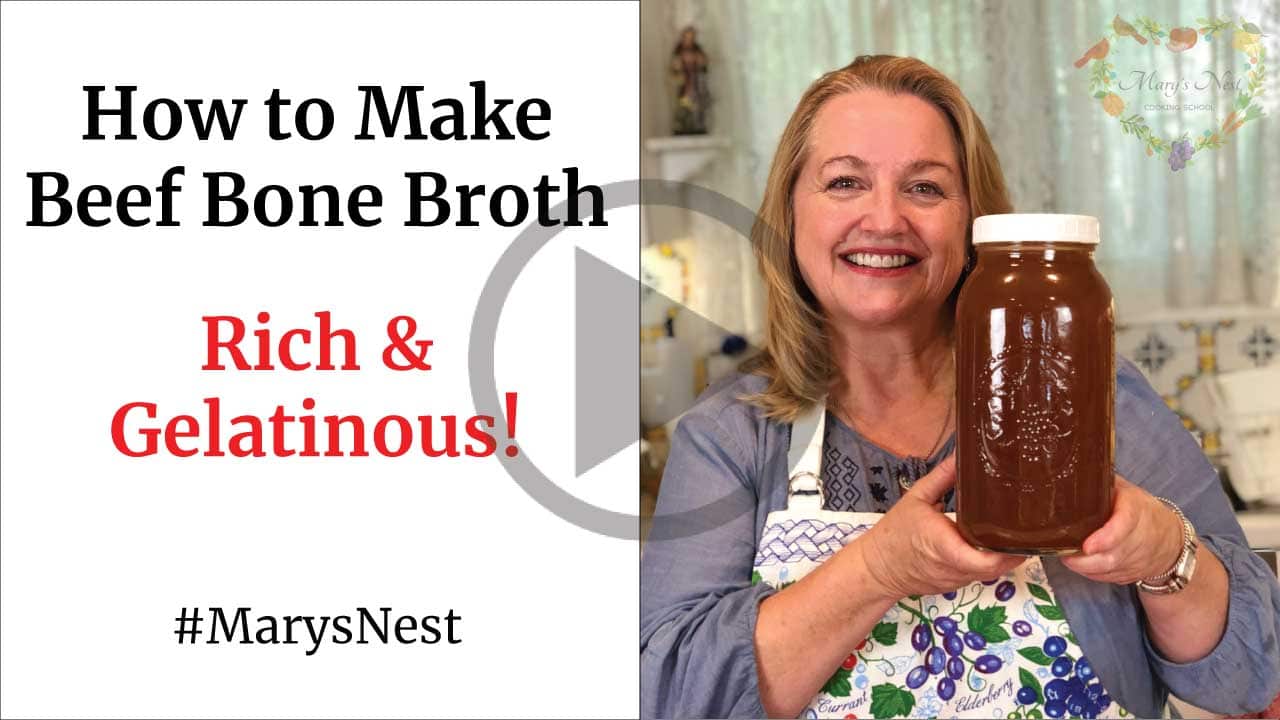
Affiliates note: As an Amazon Associate I earn from qualifying purchases. My content may contain affiliate links to products and services. If you click through and make a purchase, I’ll receive a small commission. It does not affect the price you pay.
Table of Contents
- What Makes the Best Beef Bone Broth?
- What is Bone Broth?
- Why Is a Gelatinous Bone Broth Important?
- Ingredients to Make Bone Broth
- What are the Best Bones for Bone Broth?
- How to Make Beef Bone Broth
- Recipe Tips
- What to Do With Beef Bone Broth
- Storing Tips
- Download Your Free 36-Page Pantry List
- The Modern Pioneer Cookbook
- Kitchen Academy Videos
- More Kitchen Pioneer Videos
- How to Make Rich and Gelatinous Beef Bone Broth Recipe
Although I love my Roast Chicken Bone Broth, Beef Bone Broth is the real jewel in the crown. It’s so tasty on its own or sprinkled with a bit of sea salt.
It also makes a great base for soups, stews, and gravies. And in this video, I let you in on a little secret…which are the best bones to use to get the most gelatinous beef broth!
Previously, I shared with you my How to Make Roast Chicken Bone Broth for Pennies a Jar video where I make roast chicken bone broth from the scraps left over after making a Roast Chicken.
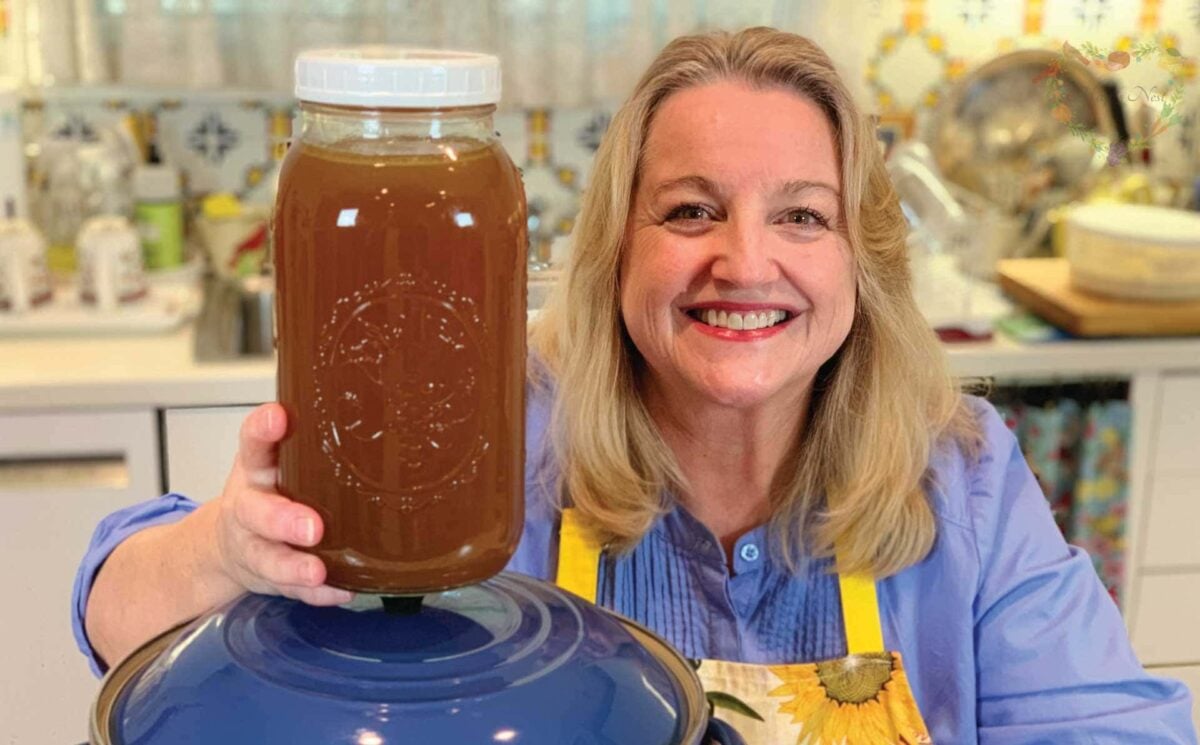
What Makes the Best Beef Bone Broth?
If you have been buying store-bought bone broth, you will be amazed at how good beef bone broth tastes when it is homemade. Plus you will be surprised at what a savings it can be. Even when using organic, grass-fed bones!
I conducted a side-by-side comparison and was pleased with the results. I found that not only did organic, grass-fed, homemade beef bone broth taste better, it was actually more economical than the best store-bought beef bone broth.
And I am all about being economical. That is why I love making bone broth of any kind. It often involves using up lots of kitchen scraps that might have otherwise wound up in the trash.
When making bone broth, kitchen waste can become close to a thing of the past. And as conscientious home cooks, we all want to work towards creating a zero-waste kitchen!
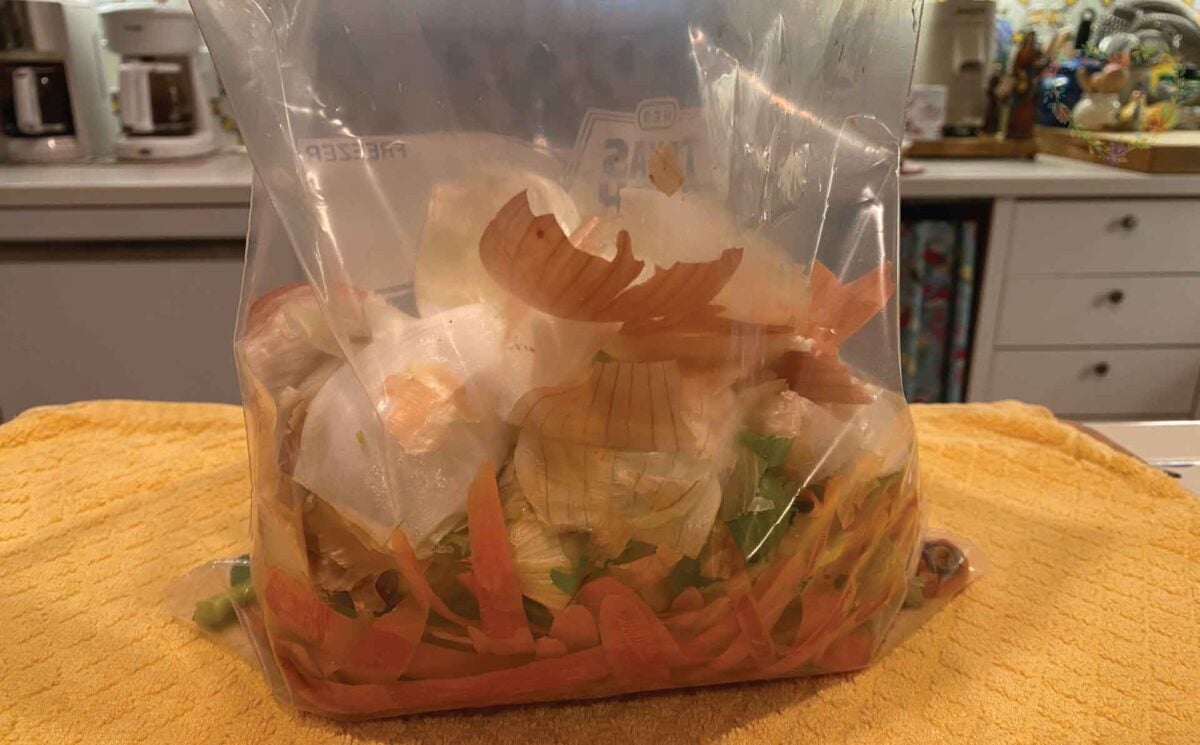
What is Bone Broth?
Bone broth can be made from any type of animal bones. The bones along with connective tissue and some meat are slow-cooked for twelve hours and then strained to make a clear broth.
As the bones and tissues are naturally high in collagen and as they cook these break down and transfer the collagen to the soup. You are left with a broth that’s packed with collagen and rich flavors.
You can learn more about what makes it different from a regular broth in my post on the differences between broth, stock, and bone broth.
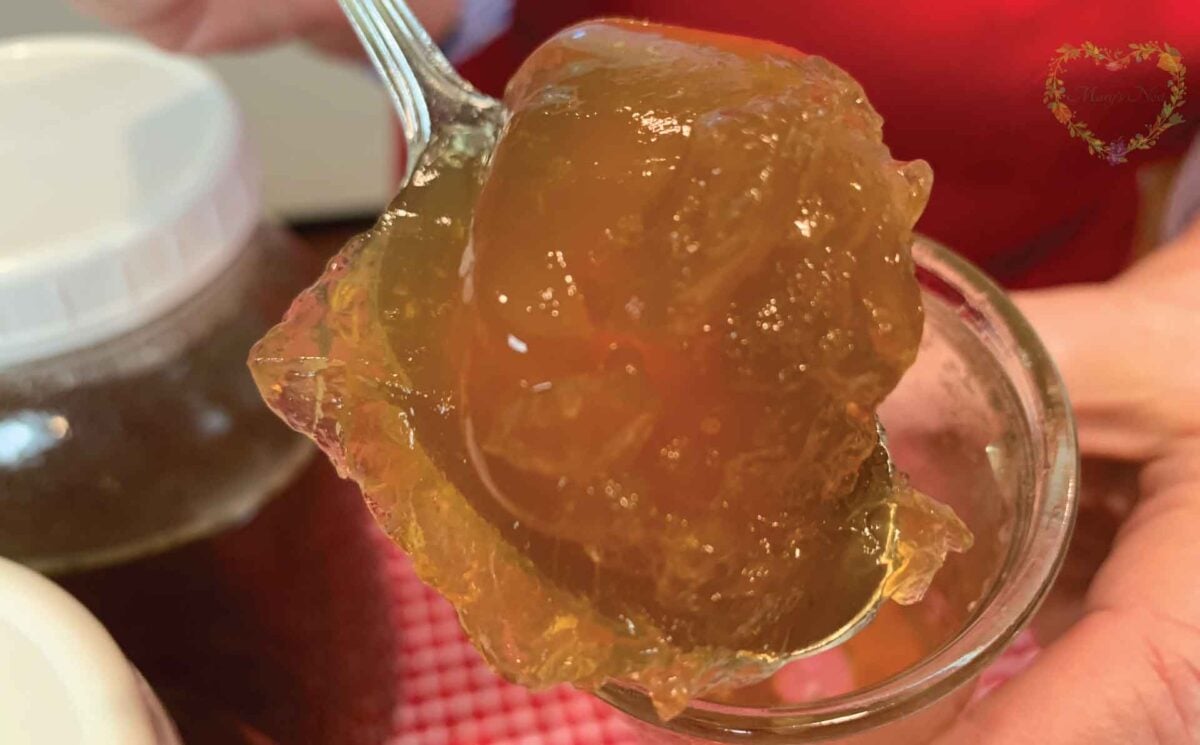
Why Is a Gelatinous Bone Broth Important?
I put a lot of emphasis on creating a gelatinous beef bone broth. If you overcook your bone broth or don’t use the right kinds of bones, your bone broth may be low in gelatin.
Instead, we want do do what we can to ensure that our bone broth is high in gelatin by selecting the best bones for bone broth and by cooking the bones at the right temperature for the right period of time. In doing so, the bones in our bone broth will release their collagen, and this collagen will turn into gelatin. And when we consume gelatin, it nourishes our entire bodies, including our skin, our hair and nails, our joints, and our guts.
Ingredients to Make Bone Broth
Find the full printable recipe with measurements below.
Wondering how to make bone broth taste better? For this specific recipe, I recommend the following ingredients for achieving a gelatinous and delicious bone broth.
- Beef bones: You can use a mixture of marrow bones, beef shank bones, beef neck bones, a beef knuckle bone, and oxtails.
- Red vermouth, port, marsala, or madeira: This adds a more complex flavor to your bone broth, but it is completely optional.
- Apple cider vinegar: This important ingredient helps to draw the minerals from the bones, making a more nutritious bone broth.
- Veggies, spices, and herbs: All you need are onions, celery, carrots, black peppercorns, and bay leaves to flavor your broth. You can also use any onion, carrot, or celery scraps you have saved in your freezer in place of using fresh vegetables. And don’t throw out your wilted lettuce! Add it to your bone broth.
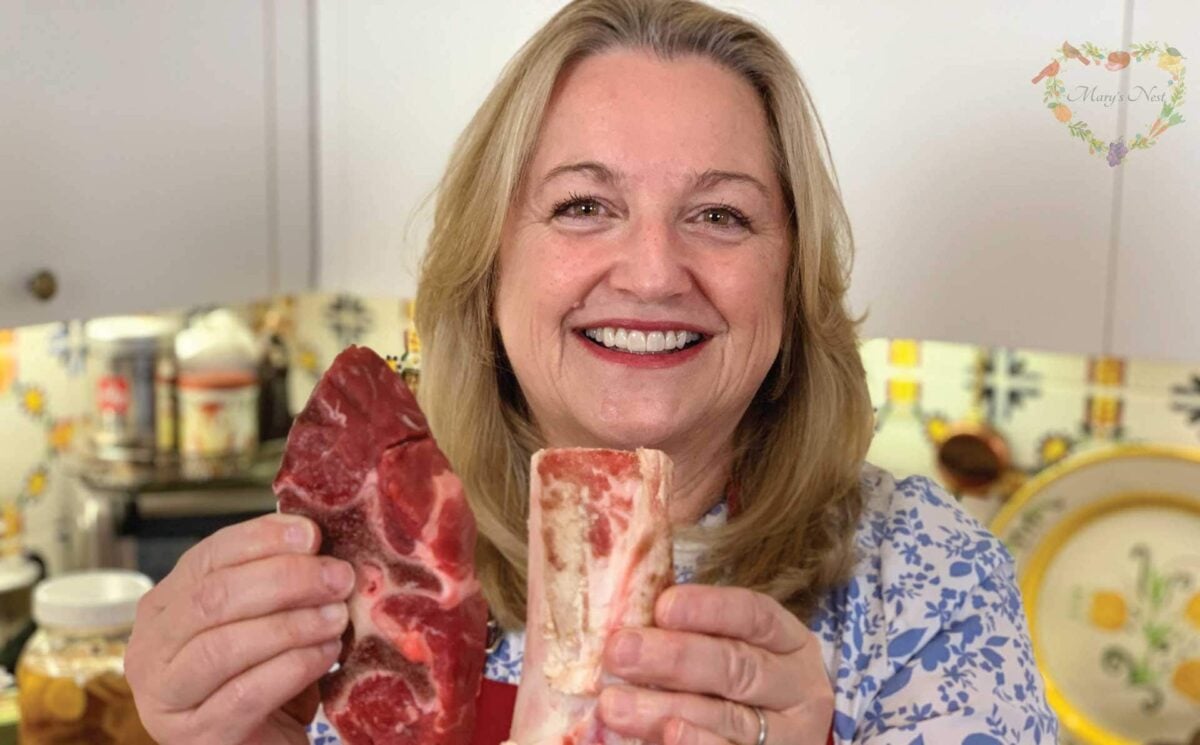
What are the Best Bones for Bone Broth?
To find a nice selection of beef bones check your local grocery store, the farmer’s market, or online sources like US Wellness Meats. (Update: Use promocode MARYNEST to save 15% off regular-priced items on your US Wellness Meats order.)
You might even be lucky enough to be able to buy beef bones from a local ranch or farm. When you are selecting your beef bones, make sure to choose a variety. Include a mix of marrow bones, meaty bones such as shanks, and high-cartilage bones such as oxtails, knuckles, or patellas.
If you’re unfamiliar with what all of these bones look like, don’t worry. I’ve got you covered. Be sure to check out my Best Bones for Making Beef Bone Broth video where I show you all these bones and share some of my favorite combinations.
If you can find beef feet, you will make a very gelatinous bone broth. And there’s a bonus! Using beef feet will yield multiple batches of bone broth. Or what I like to call, Perpetual Beef Bone Broth!
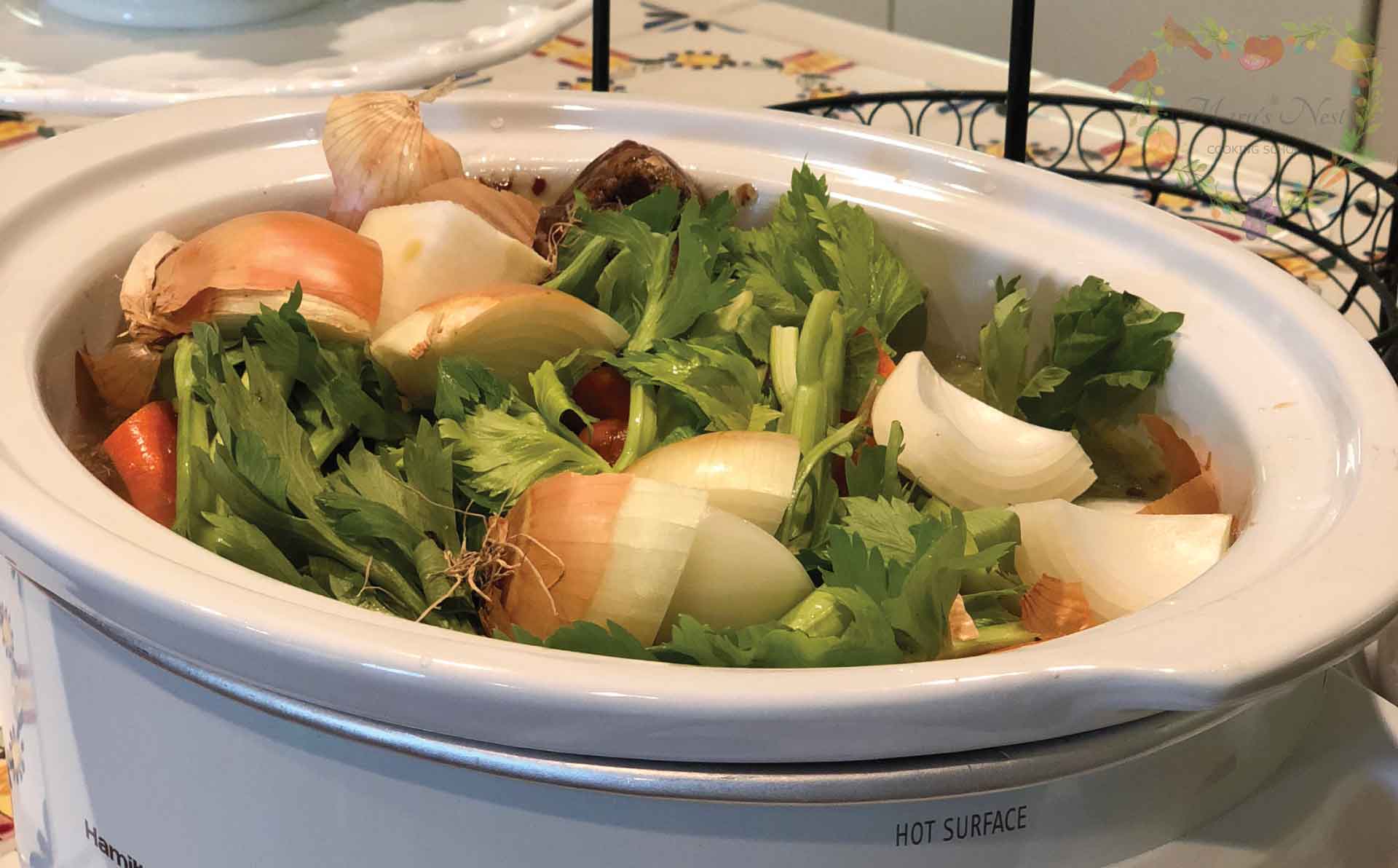
How to Make Beef Bone Broth
Once you learn how to make beef broth from bones, you’ll want to make sure you always have a regular supply on hand.
PRO TIP: Before we get started, here are a few things to note about using the slow cooker. You need a slow cooker that has a “Keep Warm” setting that heats to 180°F (82°C). This temperature creates the perfect environment for making delicious, gelatinous bone broth.
You can test this by filling your slow cooker with water, setting it on Keep Warm, and testing the temperature with a cooking thermometer after a few hours.
If your slow cooker does not have a “Keep Warm” setting, you will need to put it on the low setting and adjust the lid slightly to one side to allow for some of the heat to escape to prevent the broth from boiling.
Step 1 – Place the beef marrow bones and the knuckle bone into the slow cooker or stock pot.
Step 2 – Bake the beef shanks, neck bones, and oxtails on a baking sheet until the bones have browned.
Step 3 – Add the browned bones to your slow cooker or pot along with the onions, celery, carrots, bay leaves, and peppercorns. Cover all the ingredients with water.
Step 4 – Cover all the ingredients with water and cook the bones at a simmer for 12 hours.
Step 5 – After the broth cools, strain the ingredients with a slotted spoon.
PRO TIP: You can reuse the ingredients to make a second batch of broth.
Step 6 – Line a colander with cheesecloth or a flour sack towel and place it over a deep pot. Transfer the broth with a ladle to the lined colander so the broth drains through the lined colander and into the deep pot.
Step 7 – Transfer the pot to the refrigerator until the fat rises to the top and congeals. Skim off the fat.
PRO TIP: Keep the beef fat in a separate container and use it in other recipes.
Step 8 – Store the broth in airtight containers and store it in the fridge or freezer.
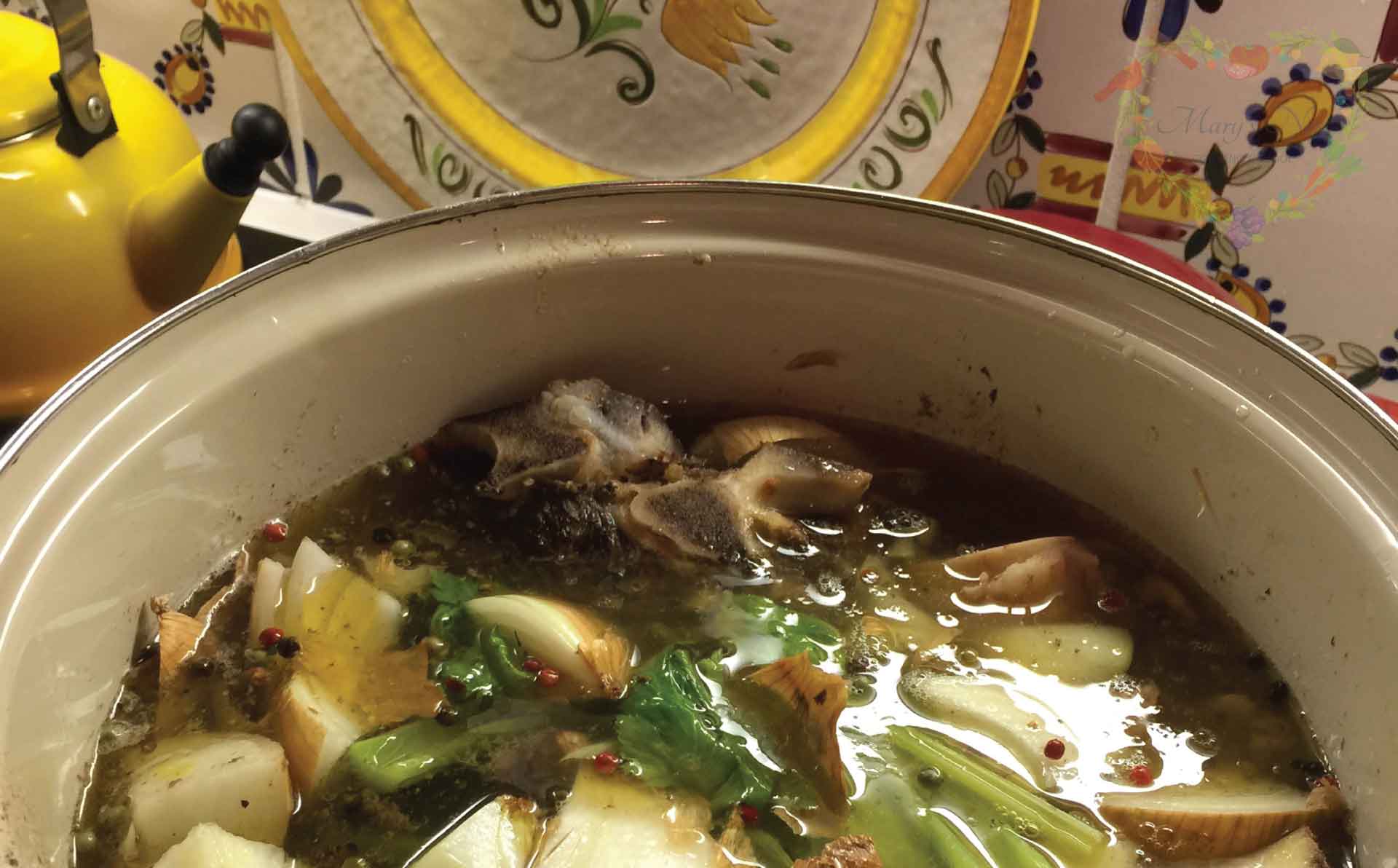
For more tips when cooking on the stove, watch my how to make bone broth on the stovetop recipe video.
How to Make Instant Pot Beef Bone Broth
Although we can also use the Instant Pot to make beef bone broth, will it be as gelateneous and tasty as making it on the stovetop or slow cooker? I’m pleased to say that when prepared correctly, beef bone broth turns out with the same rich flavor and it’s gelatinous too.
So what did I do to achieve these results? I called the Instant Pot hotline! Here is the right way for making beef bone broth in the Instant Pot:
- Make sure you use just enough water to cover the ingredients.
- Limit your cooking time to two hours. The reason for this is that too much pressure for too long will hamper your ability to create a gelatinous bone broth.
- Choose the “LOW” pressure setting on your Instant Pot. This is probably the most important tip. Too much pressure will create too high of a temperature that will destroy the chance of creating a gelatinous end product.
Following these best practices will ensure that your final product will be rich in flavor and gelatinous.
Recipe Tips
No matter which cooking method you choose, don’t use too much water. It’s the enemy of creating a gelatinous bone broth under any circumstances.
- Use a variety of bones. It’s ok if it doesn’t match the exact list in the recipe.
- Wondering where to find bones? Marrow bones or beef shanks (also called Osso Bucco) are usually readily available at most grocery stores as are beef shanks (sometimes referred to as Osso Buco). Neck bones may be harder to find, but oxtails are often available at the grocer during the springtime. If you do not see any bones at your grocery store, be sure to speak with the butcher. They may have them behind the counter, or you may be able to request a special order.
- Include a combination of bones.Knuckle bones, neck bones, oxtails, or a combination of all these bones for a more nutritious and gelatinous broth.
- Roasting marrow bones. Just taking a few minutes to roast your bones will help to make your makes a lovely broth with great flavor.
- All you need is 12 hours to cook the bones. This time is sufficient to leach the nutrients out of the bones and create a nice gelatinous broth. Cooking for too long can actually “break” the gelatin creating a watery broth, giving it an overly strong, almost “overcooked” flavor
- It’s possible to reuse your beef bones for a second batch of bone broth. Look for evidence of some cartilage or gelatinous areas remaining on the knuckle bones, neck bones, shank bones, or oxtails.
So be sure to watch the recipe video to learn more about how to create Rich and Gelatinous Beef Bone Broth right in your own kitchen! It’s very easy and you’ll wonder why you never did it before.
What to Do With Beef Bone Broth
Once you’ve made your beef bone broth there are so many ways to enjoy it and use it recipes:
- It’s suitable for sipping but you can also dehydrate bone broth to make homemade beef bouillon powder.
- You can use it to make beef stew, a beef bone broth soup, a flavorful beef gravy, or just about any soup or sauce that uses beef broth as one of the ingredients.
- Cook rice or grains in it to add more flavor.
- It’s great to add to smoothies in place of water. For beef bone broth, pair it with chocolate or coffee smoothies.
- Beef Bone broth is also delightful to enjoy sipping while warm and steaming, sprinkled with a little sea salt, straight from a mug.
Want more ideas? Explore them in this post on how to use bone broth.
Storing Tips
You can store the broth in multiple smaller containers or one single large container depending on how you plan to use it.
In the fridge, bone broth will stay fresh for 3-4 days. If frozen in the freezer of a refrigerator, it will stay fresh for 6 months. In a separate freezer that is not opened frequently, it will stay fresh for up to 12 months.
Download Your Free 36-Page Pantry List
For an extensive list of the traditional foods you can make and purchase to stock your pantry, be sure to download my free 36-page Traditional Foods Pantry List. This comprehensive eBook is full of links to recipe videos, helpful articles, and more!
And if you’re looking for a printed book full of my traditional foods recipes to show you how to create a traditional foods kitchen, be sure to preorder your copy of my new book, The Modern Pioneer Cookbook.
Kitchen Academy Videos
Are you looking for more traditional foods videos? If so, I invite you to join the Traditional Foods Kitchen Academy. Members of this optional paid YouTube community get access to exclusive videos, live streams, and other members-only perks. Plus, your YouTube comments include a special members-only badge.
More Kitchen Pioneer Videos
The Only Traditional Recipes You’ll Ever Need!
Focus on traditional recipes with real food. Don’t chase trends.
Let’s Talk Akkermansia: A Tiny Helper for Big Gut Health
Discover how Akkermansia muciniphila supports gut and immune health—and how traditional foods help this mighty microbe thrive.
How to Eat a Mediterranean Diet with a Keto Twist
Explore a Mediterranean-Keto twist with a full sample menu focused on healthy fats, quality proteins, and low-carb veggies.
Stay in Touch with Mary’s Nest
- Subscribe to My YouTube Channel for Traditional Foods Videos (Free) - When you subscribe, be sure to click on the notification bell that will let you know each time I upload a new video.
- Subscribe to Mary’s Traditional Foods Newsletter (Free) - Get a free 36-page eBook for signing up: How to Stock Your Essential Traditional Foods Four-Corners Pantry.
- Join the Traditional Foods Kitchen Academy - For more detailed videos and exclusive members-only perks, join my YouTube membership community.
- Order The Modern Pioneer Cookbook - Get a hardcover book of Mary's nourishing recipes from a Traditional Foods Kitchen. This bestselling cookbook is published by Penguin Random House with their DK imprint.
- Order The Modern Pioneer Pantry - Get Mary's latest hardcover cookbook about preserving food and making delicious meals from your Four Corners Pantry. Mary's second cookbook is also published by Penguin Random House.
I look forward to having you join me in my Texas Hill Country Kitchen!
I’d like to receive more tips and recipes from Mary’s Nest.
How to Make Rich and Gelatinous Beef Bone Broth
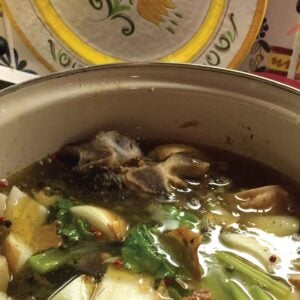
Ingredients
- 4 lbs Mixture of beef bones Marrow bones, beef shank bones, beef neck bones, a beef knuckle bone, and oxtails
- 1 cup Red vermouth, port, marsala or madeira Optional
- 1/4 cup Apple cider vinegar
- 3 Onions Quartered with skins on
- 3 Celery stalks
- 3 Carrots
- 2 Bay leaves
- 10 Peppercorns
- 1 Filtered water Enough to cover all the ingredients
Instructions
- Place the beef marrow bones and the knuckle bone into an 8-Quart slow cooker or stock pot. (If you are using a 6-Quart slow cooker, you will need to reduce the amount of bones that you are using to 3 pounds.) If you choose to use the red vermouth, etc., you can omit the apple cider vinegar. Add the red vermouth or apple cider vinegar and water to the slow cooker or stock pot just to cover the marrow bones and knuckle bone.
- Place the beef shanks, neck bones, and oxtails on to a baking sheet and bake in a 350 F degree oven until the bones have browned, approximately one hour. Once browned transfer the bones from the baking sheet to the slow cooker. Also add the onions, celery, carrots, bay leaves, and peppercorns to the slow cooker and fill with the slow cooker with water to cover all the ingredients.
- If using a slow cooker, turn it to the high setting for one hour, then turn it down to the keep warm setting and allow to simmer on keep warm for 12 hours. If your slow cooker does not have a keep warm setting, turn it down to the low setting but tilt the slow cooker lid to allow for some of the steam to escape to prevent the broth from boiling.
- If using a stock pot on the stove, bring to a boil and immediately reduce heat to low and simmer for 12 hours.
- After 12 hours, turn off the slow cooker or stove. Allow broth to cool slightly and then begin to strain ingredients with a slotted spoon. Reserve ingredients to be re-used to make a second batch of broth.
- Once all the ingredients have been strained from the broth, line a colander with cheese cloth or a flour sack towel and place over a deep pot. Use a ladle to transfer broth from the slow cooker or stock pot into the lined colander. The broth will drain through the lined colander into the deep pot.
- Once all the broth has been strained through the lined colander into the deep pot, transfer this pot to the refrigerator until the fat rises to the top and congeals. Skim off this fat and transfer it to a separate container to be used in other recipes. Transfer the broth to container(s) with a cover that can then be refrigerated or frozen. You can store the broth in multiple smaller containers or one single large container depending on how you plan to use it. This bone broth will stay fresh for 3-4 days when refrigerated. If frozen in the freezer of a refrigerator, it will stay fresh for 6 months. In a separate freezer that is not opened frequently, it will stay fresh for up to 12 months.
Video
Notes
Shop for items used in this blog post or video
- Visit Mary's Nest Amazon Shop
-
Visit my Shopping Guide page
Get up to 15% off for Stocking your Traditional Foods Pantry and Equipping your Modern Pioneer Kitchen, including discounts from US Wellness Meats, Mockmill Grain Mill, Masontops, Cultures for Health, Survival Garden Seeds, Redmond Real Salt, Plan to Eat, and more!
Favorite Bone Broth Making Supplies:
- 8-Quart Duo Plus Instant Pot
- 16-Quart Stock Pot
- 8-Quart Stock Pot
- 7-Quart Slow Cooker
- 8-Quart Slow Cooker
- 10-Quart Slow Cooker
- Fat Separator
- Stainless Steel Strainer
- Flour Sack Towels
Affiliates note: As an Amazon Associate I earn from qualifying purchases. My content may contain affiliate links to products and services. If you click through and make a purchase, I’ll receive a small commission. It does not affect the price you pay.
Disclaimer:I am not a medical doctor, a medical professional, a dietician, or a nutritionist. All content found on the MarysNest.com website, including text, images, videos, eBooks or eGuides, social media, or other formats, were created solely for informational purposes only. The content is not intended to be a substitute for professional medical advice, diagnosis, or treatment. Always seek the advice of your physician or other qualified healthcare provider with any questions you may have regarding a medical condition or proper nutritional advice. Never disregard professional medical advice or delay in seeking it because of something you have watched in a video or read on this website. Use caution when following the recipe in this video. The creator and publisher of this video and website will not be held responsible for any adverse effects that may arise from the use of this recipe and method or any other recipe and method on this website or corresponding video channel.
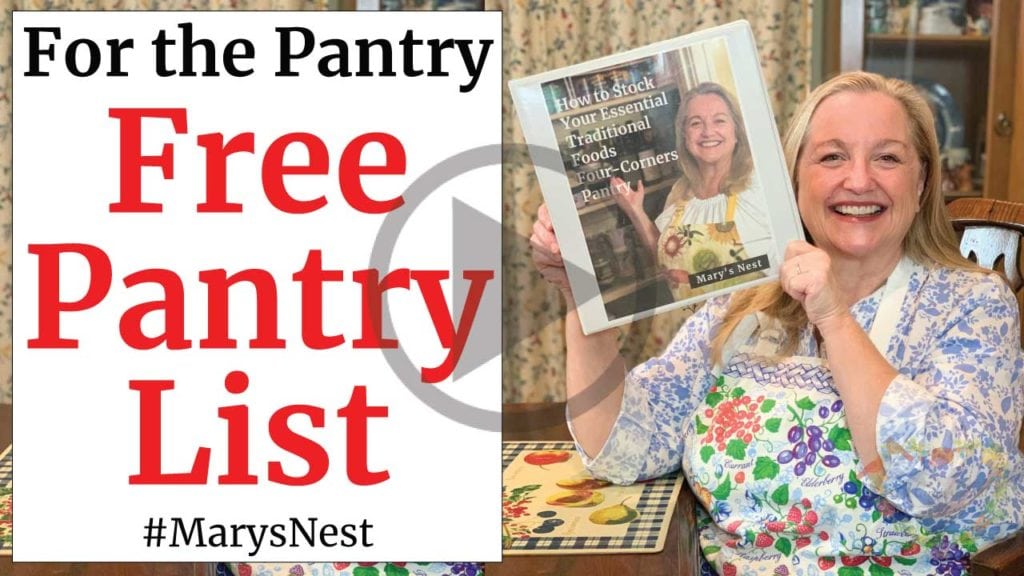
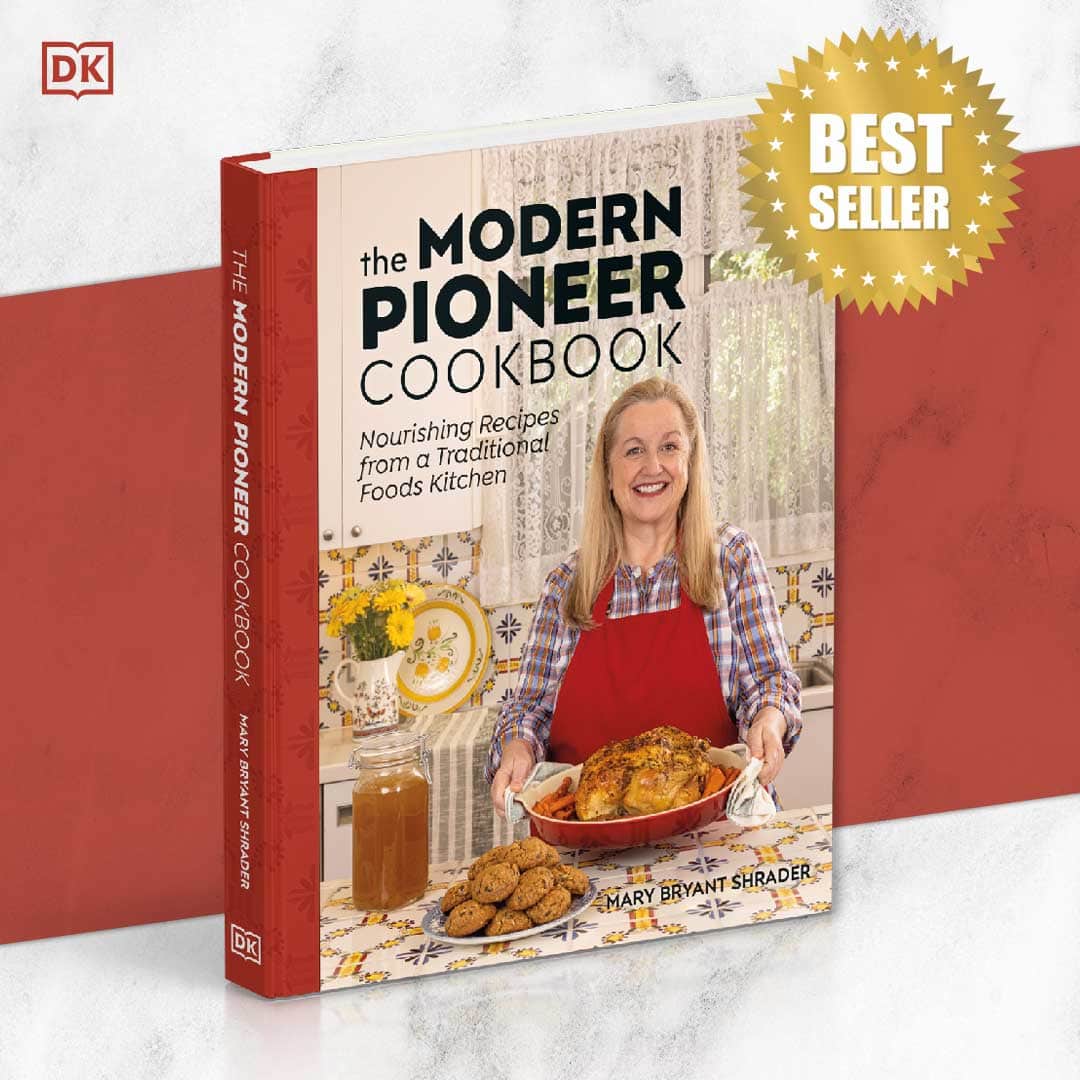
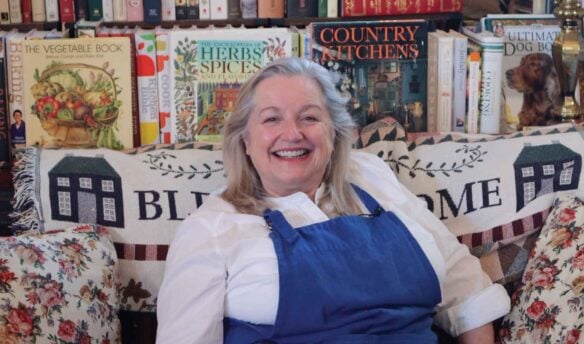
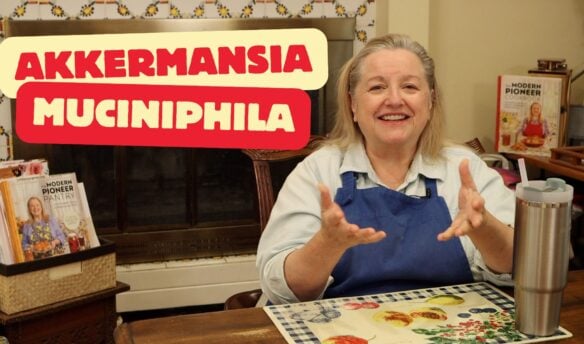

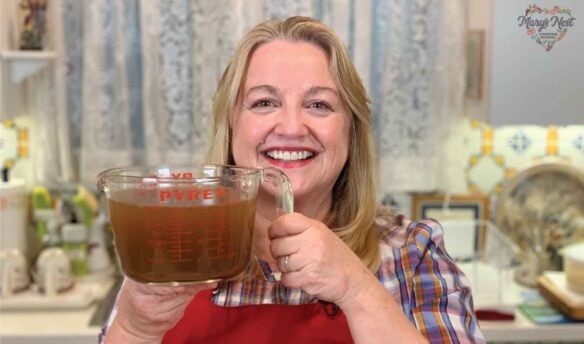
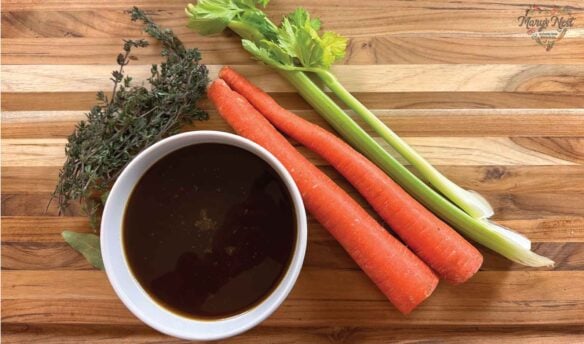

Loved your video! Thank you so much! I was doing research in how to make my bone broth more gelatinous…and you answered my question! I did go to your facebook group to join, but I haven’t been accepted yet, so I’ll ask my question here. So, I just got done making a huge batch of broth in my roaster over. I know you said not to boil the broth because that will break the collagen/gelatin. If I can my broth, will the canning process break the collagen? Is canning an okay method of preserving it? I love your videos, and I’ll definitely be back! Thank you!
Hi Jennifer, I would not recommend pressure canning bone broth because it does damage the gelatin. But if you want, you can pressure can some of it for emergencies – it still has nutrition.Thank you so much for all the kind words!! Love, Mary
Good morning Mary
I recently came across your site, because I am interested in learning how to make bone broth. Watched your you tube video this morning. You are very inspiring and loved all the tips.
My question is: What brand and type of fat separator do you have. That looks like a must have in the kitchen.
I look forward to learning more from you. Tomorrow’s video is going to be your chicken broth.
Thank you.
Take care and stay blessed.
Mary
Hi Mary, Thank you so much for the kind words! I purchased my fat separator quite a few years ago at Williams Sonoma. It was $39 but I got it on sale for $19. Since then I have seen them on amazon. Just search “fat separator” and they should come right up! Love, Mary
Hi Mary,
I am from South Korea, I like your channel very much. I just cooked the ox bone broth but was wondering what to do with the fat on the soup? I put it in a separate jar but wondering if I use it as cooking oil, is it too much fat? What do you usually do with it? Thank you very much~
Rona
Hi Rona, Thanks so much for your comment. Yes, I use it to cook with it. It is very nutritious. If you are able to find the book Nourishing Traditions by Sally Fallon, I highly recommend it. She shares some wonderful information about the health benefits of animal fats. Here is a direct link on amazon to the book: https://amzn.to/3924b6o (affiliate link).
Do you enjoy making other traditional foods in addition to bone broth? If so, I have a playlist of some of my videos titled “Mastering the Basics of Traditional Nutrient Dense Foods Cooking”. It’s a series of 15 detailed videos that covers How to Make Bone Broth, Cultured Dairy, Ferments, Sourdough Starter (my foolproof stater), Sourdough Bread, Soaked and Sprouted Nuts and Beans, and How to Soak and Sprout Grains to Make your own Sprouted Flour at Home. You can watch it here: https://www.youtube.com/playlist?list=PLkRuW3pBo2U3b4eu0QraZReKlGzA11h3y And please share the playlist with any other folks you think might be interested in learning about these types of things. I’m passionate about the book Nourishing Traditions by Sally Fallon (of the Weston A Price Foundation) and want to help as many people as I can learn how to make Traditional “Nutrient Dense” Foods.
Please let me know if you have any questions. I’m so happy to help! And I’m SO glad you’re here!! Love and God Bless, Mary❤️😘❤️
PS – Do you know about our FB group? It’s called Mary’s Nest Modern Pioneers. Come join us! We have a lot of fun chatting about Traditional Foods: https://www.facebook.com/groups/171869080205145/?source_id=210509998974645
Do you have nutritional info re: calories, fat, sodium, carbs and protein per ounce or other measure? Thank you
Hi Jim, Thanks so much for your comment. I am so sorry but I do not have that type of information. I believe that I need to get a “plug-in” that will calculate all of that for me. But I do all of this myself (plus I am in my 60s), so things take me a while to get up and running! LOL!! Hopefully, that is something I can add in the future.
Have you seen my playlist about making all different kinds of bone broth – beef (using all different types of bones), chicken, turkey, pork, and fish – in different appliances? You can look through the playlist here: https://www.youtube.com/playlist?list=PLkRuW3pBo2U0JFsTi2N7sHSpU-vBR04CH I think you might enjoy some of the videos.
In the meantime…Do you enjoy making other traditional foods? If so, I have a playlist of some of my videos titled “Mastering the Basics of Traditional Nutrient Dense Foods Cooking”. It’s a series of 15 detailed videos that covers How to Make Bone Broth, Cultured Dairy, Ferments, Sourdough Starter (my foolproof stater), Sourdough Bread, Soaked and Sprouted Nuts and Beans, and How to Soak and Sprout Grains to Make your own Sprouted Flour at Home. You can watch it here: https://www.youtube.com/playlist?list=PLkRuW3pBo2U3b4eu0QraZReKlGzA11h3y And please share the playlist with any other folks you think might be interested in learning about these types of things. I’m passionate about the book Nourishing Traditions by Sally Fallon (of the Weston A Price Foundation) and want to help as many people as I can learn how to make Traditional “Nutrient Dense” Foods.
And for more details on some of these subjects mentioned above…(and more), be sure to check out these detailed playlists:
➡️How to Make Fermented Vegetables: https://www.youtube.com/playlist?list=PLkRuW3pBo2U2EhVspEV5d4Xs2s4pcbHbr
➡️How to Make Fermented Condiments: https://www.youtube.com/playlist?list=PLkRuW3pBo2U0hCKYoMMBeVD-9bA6TckEj
➡️The Complete Guide to Sourdough: https://www.youtube.com/playlist?list=PLkRuW3pBo2U3NKN0GHvGCpiWNxcTefLof
➡️And if you are interested in learning about how to make various types of Homemade Dairy including Cultured Butter, Cottage Cheese, Sour Cream, Ricotta Cheese, and more, be sure check out this playlist: https://www.youtube.com/playlist?list=PLkRuW3pBo2U2R7u0Ri26HwdLMjUa4iJJX

➡️Also…If you enjoy making homemade pantry type items, you might enjoy my playlist: https://www.youtube.com/playlist?list=PLkRuW3pBo2U1MqC3YAw7ZRYjuL9FBGSwc where I show how to make Apple Cider Vinegar (see more info about this below), 10 Flavored Extracts including Vanilla Extract, 10 Seasoning Blends including Ranch Dressing Mix and Onion Soup Mix, 1- Minute Homemade Mayonnaise, Homemade Bouillon – and how to dehydrate it, Natural Food Colorings, Evaporated Milk, Condensed Milk, Preserved Citrus, and more!
And if you like the idea of making your own Apple Cider Vinegar as mentioned above…Be sure to check out the Apple Cider Vinegar Playlist: https://www.youtube.com/playlist?list=PLkRuW3pBo2U1QPA95O2-oOvxwtO-v3L4L which a 3-part series where I walk you through the entire 30-day process. And if you like making vinegar, I also have a Homemade Citrus Vinegar Playlist: https://www.youtube.com/playlist?list=PLkRuW3pBo2U3apQRTzhfQBkR_x0rb514U And I have one more vinegar video where I show how to make vinegar from Strawberry Scraps. You can watch it here: https://www.youtube.com/playlist?list=PLkRuW3pBo2U2M3dRA483q5KJ7JkJfn3fS
➡️And…Have you seen my playlist for making immune boosting foods and natural remedies including a Super Mineral Detox Broth? You can look through the playlist here: https://www.youtube.com/playlist?list=PLkRuW3pBo2U0p9nRAWldbyqYSbgwzARGd You may like some of these recipes.
➡️And if you are interested in how to make probiotic rich fermented drinks, here is my playlist of some fun drinks including How to Make Homemade Sodas, Mocktails, Drinking Vinegar, Homemade Energy Drinks, Switchel, Shrubs, and More: https://www.youtube.com/playlist?list=PLkRuW3pBo2U2w2-CiBrkNnZj_IIlqZc9h You may enjoy these videos. And if you are interested in learning how to make Kombucha and/or Water Kefir, I have a playlist which includes a Beginners Guide to Kombucha Making along with a video on making water kefir for beginners…which you can watch here: https://www.youtube.com/playlist?list=PLkRuW3pBo2U3YysV0OYOMsxsJuf_sxPTK
➡️And in the Modern Pioneering spirit…If you enjoy canning, or are interested in learning about canning, I have a playlist of my canning videos here which include step-by-step tutorials: https://www.youtube.com/playlist?list=PLkRuW3pBo2U3HJRCmwVAvBNS90WjifR1U
➡️Oh…And here is my 2020 Channel Update for everything I have planned for this year: https://youtu.be/qjOJh8Cb_-k
Please let me know if you have any questions. I’m so happy to help! And I’m SO glad you’re here!! Love and God Bless, Mary❤️😘❤️
PS – Do you know about our FB group? It’s called Mary’s Nest Modern Pioneers. Come join us! We have a lot of fun chatting about Traditional Foods: https://www.facebook.com/groups/171869080205145/?source_id=210509998974645
How much I can Drink In a day? I use to drink 10oz a day. Can I increase the quantity?
Hi Anna, Thanks so much for your comment. I have never heard of an exact amount of bone broth that one can drink in a day. I usually have about a 12 ounce mug at breakfast but I’m sure that drinking more is fine too.
Have you seen my playlist about making all kinds of different bone broth? You can look through the playlist here: https://www.youtube.com/playlist?list=PLkRuW3pBo2U0JFsTi2N7sHSpU-vBR04CH I think you will like them.
BTW – Do you enjoy making traditional foods? If so, I have a playlist of some of my videos titled “Mastering the Basics of Traditional Nutrient Dense Foods Cooking”. It’s a series of 15 detailed videos that covers How to Make Bone Broth, Cultured Dairy, Ferments, Sourdough Starter (my foolproof stater), Sourdough Bread, Soaked and Sprouted Nuts and Beans, and How to Soak and Sprout Grains to Make your own Sprouted Flour at Home. You can watch it here: https://www.youtube.com/playlist?list=PLkRuW3pBo2U3b4eu0QraZReKlGzA11h3y And please share the playlist with any other folks you think might be interested in learning about these types of things. I’m passionate about the book Nourishing Traditions by Sally Fallon (of the Weston A Price Foundation) and want to help as many people as I can learn how to make Traditional “Nutrient Dense” Foods.
Also…If you enjoy making homemade pantry type items, you might enjoy my playlist: https://www.youtube.com/playlist?list=PLkRuW3pBo2U1MqC3YAw7ZRYjuL9FBGSwc where I show how to make Apple Cider Vinegar, Flavored Extracts, Natural Food Colorings, Evaporated Milk, Condensed Milk, Preserved Citrus, and more!
Also, Do you know about our FB group? It’s called Mary’s Nest Modern Pioneers. Come join us! We have a lot of fun chatting about Traditional Foods: https://www.facebook.com/groups/171869080205145/?source_id=210509998974645
Please let me know if you have any questions. I’m so happy to help! And I’m SO glad you’re here!!
Love and God Bless, Mary
Hi Anna, Thanks for your comment. Oh yes, you can certainly drink more. I usually take a 12 ounce mug in the morning and I also use bone broth throughout the day in my cooking. Hope this helps. Love, Mary
Hi Mary,
When I make a beg bone broth only out of marrow bones, can I make a second batch out of them and it still being nutritionist?
Hi Karin,
Thanks so much for your comment. Marrow bones often don’t contain a lot of collagen unlike high cartilage bones (oxtails, knuckles, and patellas) so it may be difficult to get a good second batch from marrow bones along. Have you seen my playlist about making all kinds of different bone broth? You can look through the playlist here: https://www.youtube.com/playlist?list=PLkRuW3pBo2U0JFsTi2N7sHSpU-vBR04CH
BTW – Do you enjoy making other traditional foods? I have a playlist of my videos titled “Mastering the Basics of Traditional Nutrient Dense Foods Cooking”. It’s a series of 15 detailed videos that covers How to Make Bone Broth, Cultured Dairy, Ferments, Sourdough Starter (my foolproof stater), Sourdough Bread, and How to Soak and Sprout Grains to Make your own Sprouted Flour at Home. You can watch the VIDEOS here:
https://www.youtube.com/watch?v=qCWcFsG-Np0&list=PLkRuW3pBo2U3b4eu0QraZReKlGzA11h3y
Also, Do you know about our FB group? It’s called Mary’s Nest Modern Pioneers. Come join us! We have a lot of fun chatting about Traditional Foods:
https://www.facebook.com/groups/171869080205145/?source_id=210509998974645
Please let me know if you have any questions. I’m so happy to help! And I’m so glad you’re here!!
Thank you again for commenting!
Love, Mary
Hi Mary,
When making the bone broth in a stock pot on the stove do you keep the lid on or off ?
Thank you
Anne
Hi Anne, Thanks so much for visiting. You can leave the lid off or tilt it to one side. You want to allow for evaporation. Let me know if you have any other questions. I’m so happy to help. Love, Mary
Hi Mary I love the beef broth. Made the broth twice now, first time in a big pot then my neighbour lend me his slow cooker. Off now to buy a slow cooker of my own because I love the broth so much. Love your video, you cover everything. Thanks
Hi JP, Thank you SO much for the kind words! I am so happy that you are enjoying making bone broth. It’s fun to be on this traditional foods journey together! Love, Mary
Hi Mary,
Can you give me the best ratio off bones ( bone marrow and / or knuckle bones ) and meaty bones ( like oxtail, ribs ) in order to gift the best flavour of bone broth. I had tried many composition and ratio but still not get the best in taste / flavour.
Regards,
Ibas
Hi Ibas, Thanks so much for visiting! I generally the find that the best ratio is 2 parts meaty bones, 1 part high cartilage bones, and 2 part marrow bones. So for example, that would be 2 parts shanks, 1 part oxtails, and 2 parts marrow bones. The best taste will be achieved by browning the meaty bones and cartilage bones in a hot oven – 425F for about 45 minutes. Then be sure to add all the drippings to your stock pot/slow cooker. Plus, for additional flavor, you can also brown your veggies. Hope this helps. Oh! And be sure to add a little sea salt to the bone broth when you go to warm it and drink. That will really help the flavor come alive! Love, Mary
Hi Mary,
I had saw to your video and had it tried few days ago. It taste so good. But i had two issue on the broth which i made previously. First is acummulation of scum floating in the broth, what do you do in order to eliminate scum accumulation ( i had saw many video in youtube showing that boil the bones for 5 minutes before slow cook may remove the scum, but i am not sure to apply it because in will make the broth become not gelatinous and have less nutrients prior to vigorously boiled on high temp).
2. Secondly.. on making broth, I prefer to slow cook the bones for up to 48 hours in order to make bold meat essence on the broth. Because of that i’m facing the large amount of of decreasing water / broth volume due to evaporation. Do we need to add additional water in order to maintain the level of water / broth in crockpot is enought to submerged the bones and ingredients ? Previously i choose not to add some water during the slow cook process, so only less than half of water is left on the end of slowcook. Please gift me , your advice and experience.
Hi Ibas, As to the accumulation of scum that floats to the top, just skim it off with a spoon. That is the easiest way to get rid of it and all that is necessary to do. No need to parboil the bones. you are correct in knowing not to boil your bones. As to evaporation – do you keep the lid on your slow cooker? And do you have it set to “keep warm”? If so, you should have very little evaporation. However, that said, you do not have to simmer your bone broth for 48 hours. Instead, simmer it for 12 hours, then strain it and reuse the bones (plus fresh veggies), to make a second batch of bone broth. Simmering the bone broth for just 12 hours will eliminate the evaporation problem and will make a gelatinous nutrient rich bone broth. I hope this information helps. It is a delight to have you here. I love your enthusiasm. It is a joy to be on this traditional foods journey with you! Love, Mary
Hi Marry,
Thanks for the awesome video I did not see any salt added may you correct me if I am wrong and if you may I know the reason?
Thank you so much for commenting! And for the kind words!! Yes, You are correct. I do not add any salt when I am making beef bone broth. I like to add the salt when I use the broth as a drink or in a recipe – – – that way I can control the salt. Hope this helps! Love, Mary
You didn’t tell us how to do the second cooking of the bones. Can you please let us know+
Hi Rose, I have another video all about that. You can watch it here: https://www.youtube.com/watch?v=F9m2C4FKHow&list=PLkRuW3pBo2U0lOYjdmYtG2uVEG9Xn6yRn Hope this helps. Please let me know if you have any questions. Love, Mary
wonderful video on bone broth.
Thank you SO much! Glad you liked the video!
Do you enjoy making other traditional foods? I have a playlist of my videos titled “Mastering the Basics of Traditional Nutrient Dense Foods Cooking”. It’s a series of 15 detailed videos that covers How to Make Bone Broth, Cultured Dairy, Ferments, Sourdough Starter (my foolproof stater), Sourdough Bread, and How to Soak and Sprout Grains to Make your own Sprouted Flour at Home. You can watch the VIDEOS here:
https://www.youtube.com/watch?v=qCWcFsG-Np0&list=PLkRuW3pBo2U3b4eu0QraZReKlGzA11h3y
Also, Do you know about our FB group? It’s called Mary’s Nest Modern Pioneers. Come join us! We have a lot of fun chatting about Traditional Foods:
https://www.facebook.com/groups/171869080205145/?source_id=210509998974645
Love, Mary
Hi Mary 🙂
If using a stock pot should I reduce the heat to the absolute lowest setting on my electric cooktop ? Also, do I simmer with the lid on it off ?
Thank you 🙂
Hi Christine,
Thanks so much for your comment. Yes, if you use a stock pot on the stove, put it to your lowest setting and allow it to simmer without the lid tilted so that moisture can evaporate. You can also simmer it with the lid off but I have found that just tilting the lid helps keep the aroma from becoming too strong in the kitchen – especially if you can run an exhaust fan – if you have one on your cooktop.
BTW -Do you enjoy making other traditional foods? I have a playlist of my videos titled “Mastering the Basics of Traditional Nutrient Dense Foods Cooking”. It’s a series of 15 detailed videos that covers How to Make Bone Broth, Cultured Dairy, Ferments, Sourdough Starter (my foolproof stater), Sourdough Bread, and How to Soak and Sprout Grains to Make your own Sprouted Flour at Home. You can watch the VIDEOS here:
https://www.youtube.com/watch?v=qCWcFsG-Np0&list=PLkRuW3pBo2U3b4eu0QraZReKlGzA11h3y
Also, Do you know about our FB group? It’s called Mary’s Nest Modern Pioneers. Come join us! We have a lot of fun chatting about Traditional Foods:
https://www.facebook.com/groups/171869080205145/?source_id=210509998974645
Love, Mary
Hi 🙂 I would love to try your recipe:) my slow cooker only has a low and high setting. Both settings only reach a temperature just below boiling point. Should I bring the broth to a boil over the stovetop and then transfer to the slow cooker ?
Thank you 🙂
Hi Christine, Don’t worry if your slow cooker doesn’t come up to a boil. When your slow cooker reaches a temp just below the boiling point, skim off any foam you see and then turn your slow cooker down to the lowest setting.
Hope this helps. 🙂 Please let me know if you have any other questions. I’m happy to help!
Love, Mary
Hi Christine, Great question. That sounds like a good idea – and if you want you can always just let the bone broth simmer on your stove top. Love, Mary